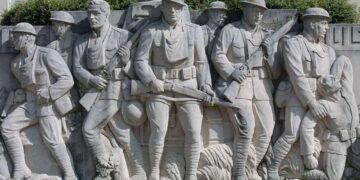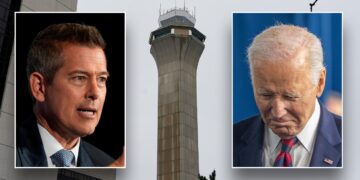The strain as well. Three months earlier, another American general, Horatio Gates, catapulted himself onto the national scene by defeating the British at Saratoga, New York. The victory has given America a new war hero, one with boundless ambition. >> Horatio Gates wanted to be commander in chief of the
American army, and it goes much beyond that. Whoever was the victorious leader of the revolutionaries would emerge as the leader of a new nation. >> narrator: At the same time that Horatio Gates’ stock is on the rise, Washington’s is in free fall. At Brandywine, Pennsylvania, the Americans fought the largest
Engagement of the war so far, and Washington suffered one of his worst losses: 1,000 American soldiers are wounded or killed, and Washington is forced to retreat north into New Jersey. The victory at Brandywine gives the British the prize they were after: the rebel capital, Philadelphia. Independence Hall, the seat of
Rebel power, now sits empty, a burning reminder of Washington’s failures. America’s rebel Congress is now a body in exile and have set up a new home 100 miles to the west of Philadelphia, in York, Pennsylvania. In the chamber, there are murmurings that George Washington is weak-willed, that the general’s poor judgment
Keeps the Americans from defeating the British. >> The expectations that civilian leaders had that Howe’s army could be conquered just like that. There were doubters and carping and criticism and Monday morning quarterbacking against what he had done. >> narrator: Revolutionaries like Samuel Adams are calling the abilities of their commander
In chief into question. >> “Our troops are victorious in the north. The enemy troops are divided and scattered over a country several hundred miles. If we do not beat them this fall, will not the faithful historian record it as our own fault?” –Samuel Adams. [gavel pounding] >> narrator: Congress takes
Action and names Horatio Gates to head the newly created Board of War, a position that gives him a say in American military strategy. >> This is the low point of George Washington’s professional life. Congress begins to lose confidence in him. Gates’ followers are pumping up Gates, and the idea is then
Broached that Gates ought to be the commander in chief. But now Washington, knowing that he’s seen as weak, must win big soon to solidify that command. [wind howling] >> narrator: But the Continental army is in no shape for a fight, and in 18th-century warfare, winter is the time to rest,
To train, to resupply. For Washington, now is the time to rebuild his army and his reputation, and do it before the winter is over. It will be an uphill battle at the soon-to-be-storied Valley Forge. It is a strategic location. Just 23 miles north of Philadelphia, Valley Forge is an ideal place from which
To keep a close eye on the movements of the British army and stop the enemy from pillaging the fertile countryside. Sitting on a plateau, the camp is easily defensible. Creeks and the Schuylkill River provide a natural fortification to the camp. But building and running a city 1/3 the size of Philadelphia
Is a mammoth undertaking. Washington throws himself into the work. He designs the camp himself down to the last detail: the layout of the barracks, the placement of roads, the location of its defenses. Washington enacts strict rules to fight typhus and dysentery. Soldiers who do not use proper privies face five lashes
To be administered on the spot. Soldiers who contract venereal disease from prostitutes selling their services on the peripheries of camp pay for their own treatment–$4 for the rank and file, and $10 for the officers. These seemingly mundane tasks consume all of Washington’s time. >> We might accuse him of being
A micromanager, but in fact, this was a situation that needed micromanaging. He has to really pay attention to the minutia, because it’s the minutia that’s going to kill off his army. Dysentery and other camp diseases are going to create havoc in his camp unless matters of sanitation are attended to carefully.
So he has to play close attention to the details, and he does it really well. >> narrator: Washington’s hands-on approach wins the admiration of his soldiers, and he assures the men that he himself “will share in every hardship and partake in every inconvenience.” During the first month of construction at Valley Forge,
Washington chooses to live in a tent at the edge of camp alongside his army. Life in Philadelphia, however, stands in stark contrast. For the British, the winter break from the war brings a return to the creature comforts that status affords. >> The British army is very warm and comfortable wherever
They want to be, whether it’s New York or Philadelphia. They have no problems. Their problem is deciding which tavern to drink at at night. >> narrator: The British may have lost at Saratoga, but they hold the rebel capital and are savoring it for all it is worth. Evenings are filled by social
Gatherings, and each Thursday, there is a ball where Philadelphia’s high society Loyalists mingle with the British officer class. Back at Valley Forge, the temperature hovers around freezing, and many of the soldiers are forced to wrap their feet in rags for lack of shoes. But the men make do,
Fighting off the cold by playing cards, mending their clothes, and learning new drills. For soldiers like Joseph Hodgkins, a 34-year-old cobbler from Massachusetts, letters from home are a bittersweet reminder of what has been left behind. >> “My dear, I have looked for you till I know not how to look any longer.
Monday afternoon, I was very low in spirits, almost despair of your coming home. Brother Perkins and sister send their love to you. Your most affectionate companion till death, Sarah.” >> narrator: As the winter grinds on at Valley Forge, supply shortages become a problem. America has never had to feed and clothe an army.
During the Seven Years’ War, just a fractions of the soldiers’ food came from the colonies. All the rest was shipped across the ocean from England. And since the outset of the war, the congressionally controlled provisioning offices have struggled mightily to supply the army. >> Supplying the Continental army was immensely complex.
We call it the Continental army, thinking of it as a national permanent army, a regular army, which it was. But in many ways, it’s still organized and paid for locally. Each state was responsible for supplying its own troops, and this creates enormous confusion. >> narrator: In February, the army’s supply lines grind
To a halt. The staple diet for the soldiers becomes “fire cakes,” a meager meal made of flour mixed with water into an unappetizing paste that is cooked over an open fire. It is a far cry from the promised daily ration of a pound of beef and a pound of bread.
Washington is all too aware of the hardships faced by his soldiers. With his army facing starvation, he throws himself into a writing frenzy, petitioning the states for more food and clothing, pleading to Congress for more power to oversee the supply offices, and imploring local officials to send more aid.
But for all of his efforts, relief is slow in coming. Washington will need help to turn his army back into a fighting force, and it will come from a most unlikely source: a new arrival in camp, a Prussian who goes by the name of Frederick Wilhelm Augustus Heinrich Ferdinand, Baron von Steuben.
>> narrator: February 1778: the winter at Valley Forge is taking a heavy toll on the Continental army. 2,500 soldiers die from disease, more than have been killed in battle in the entire war. Thousands of others are incapacitated by sickness and hunger. Washington has done his best to hold his army together
But is still under pressure from Congress to mount a successful spring campaign and take back Philadelphia from the British. But to achieve that goal, he will have to enlist the help of others. On February 17th, a new recruit arrives in camp, sent by the American Congress to aid in the cause.
He calls himself Frederick Wilhelm Augustus Heinrich Ferdinand Baron von Steuben and wears the bejeweled Cross of the Order of de la Fidélité, denoting an honorary knighthood from Prussia. Von Steuben carries letters of introduction but no papers confirming his achievements, an omission that should be a clue, for the Baron is stretching his story
Just he’s stretched his name. He has never risen higher than the rank of captain, and he has been turned down for service by the French, Spanish, and German armies amidst rumors he has taken “familiarities with young boys,” which the law forbids and severely punishes. In short, von Steuben has come
To the only army in the world that will have him: the Americans. The baron’s past may be shrouded in mystery, but Washington is desperate for leadership, for officers with European training. He puts von Steuben right to work. The task: to create a single method of training, a critical step towards a more professional
Army and to do it before the winter is over. Von Steuben embraces the opportunity. The baron starts small, spending hours each day working directly with a model unit that will be used to train the rest of the army. >> Baron von Steuben is a remarkable figure. Von Steuben’s genius was the
Ability to distill the complexity of state-of-the-art European drill tactics into a digestible form to this raw material that was the American soldier. >> narrator: They are tactics that are new to Washington and his army, tactics learned during the baron’s service in the Prussian army, but he makes an important adjustment in the way
He teaches them. >> Von Steuben recognized that he was not dealing with Prussian conscripts. He recognized the individuality and the republican notions of the population of troops that he dealt with, and he was able to take principles and tactics and give them to this force in such a manner that they were
Willing to receive it and that they were able to transform themselves from virtuous republicans into soldiers in a professional army. >> narrator: Under von Steuben’s tutelage, the soldiers learn how to form solid orderly columns, how to properly load and fire a weapon in formation, and the proper use of a bayonet.
>> The army that comes out of Valley Forge is in many ways a much more sophisticated one than the one that goes in there. Von Steuben brings a new level of professionalism to the army, and that by itself creates its own sense of professionalism. It creates its own sense of belonging.
They’re belonging to something larger than themselves. >> narrator: In a matter of weeks, the ragtag unit is marching in lockstep. Soon every soldier is taught the von Steuben technique. It becomes the foundation for the army’s first training manual. Washington’s army is slowly remade. It is nearly battle-ready. In March, spring finally comes
To Valley Forge. The dark months of winter begin to fade away, yet food shortages have been a recurring problem. For the young general Nathanael Greene, watching his army go hungry is more than he can bear. At 35, the formidable Greene is a rising star in the army, even though he is an unlikely
Soldier. Born in Rhode Island, Greene is a successful merchant from a devout Quaker family that loathes war, but he is ambitious and fiercely loyal. When war breaks out, he throws himself behind the patriot cause. Greene becomes the youngest brigadier general in the Continental army at age 33.
Now he has risen to the rank of major general and is one of Washington’s closest confidants and one of the loudest critics of the army’s failed supply departments. >> “The quartermaster general, commissary general, and clothier general departments are in such a wretched condition that unless there are some very good alterations in those
Departments, it will be impossible to prosecute another campaign. Our troops are naked and the men getting sickly in their huts.” –Nathanael Greene. >> narrator: Greene’s experience as a merchant leads him to take matters into his own hands. He leads foraging parties into the Pennsylvania countryside to round up food and supplies,
But the citizens are often unwilling to give up their property, even to an army fighting for their independence. It creates a precarious situation. >> Washington didn’t want to alienate the local civilian population. He did what he could to supply the army, but he wants to protect that relationship with the local community.
[cow moos] >> narrator: But desperate times call for desperate measures. When persuasion fails, livestock and grain are occasionally taken at the end of a musket. Greene leaves the scared civilians with the only reimbursement his army is offering: the promise of future payment, an IOU. Greene’s efforts impress Washington, who puts him inCharge of acquiring supplies for the army. The duty-bound general accepts his assignment as quartermaster, but it is certainly not the commission that he had hoped for. >> “Nobody ever heard of a quartermaster in history. All of you will be immortalizing yourselves in the golden pages of history, while
I am confined to a series of drudgeries to pave the way for it.” –Nathanael Greene. >> This is the classic case of a successful general being called back to the Pentagon to be a bureaucrat, and Greene doesn’t want that. But on the other hand, it’s a sense of Puritan guilt.
It’s a sense of sacrificing what’s good for you for what’s good for your country. >> narrator: Greene dispatches foraging parties far and wide– south into Virginia, to the eastern shore of Maryland, and north into New Jersey, rebuilding the supply lines for the army. The efforts of Baron von Steuben
And Greene over the winter at Valley Forge have given Washington confidence that he has an army that is now ready to take the fight to the British. Meanwhile, an ocean away, a bold American is pushing the war to a new and unlikely front: the shores of England itself. >> narrator: April 1778:
The long winter at Valley Forge has finally come to an end. The Continental army continues to train in preparation for the summer campaign, one that Washington hopes will bring a much needed military victory and vindication for his previous losses. But the fighting season is still months away.
For now, all the general can do is ready his troops. Unbeknownst to Washington, though, the War for Independence is spreading to a new and unexpected front: across the ocean. On a chilly spring morning, a lone American ship, the Ranger, cuts through the water off the coast of England. Their target: the port towns
Along the western coast of Britain. It has been 700 years since anyone has raided these shores, 700 years since a foreigner has rained terror on the inhabitants of the British mainland. The architect of this bold plan: John Paul Jones. At first sight, the 31-year-old Jones is an unlikely captain.
He is short in stature and soft in his speech. But the Scottish-born Jones is already a veteran sailor. >> Jones is a proud man. He’s a very handsome man, almost beautiful to look at. He’s wearing a British naval uniform. Now, you may wonder, why would an American naval officer wear
A British navy uniform? Because he thought it was better-looking. >> narrator: Jones is the son of a gardener who set out for the open sea at the age of 13 to make a name for himself working on merchant and slave ships. >> Jones casts himself in his
Own play, and it’s a play of upward mobility. This is a notion that’s very 20th-century, but in the 18th century, it was unusual. In the 18th century, your place in society is defined. That’s not the way John Paul Jones wants to see world. He wants to be a rising figure.
He wants to overcome his modest origins and become a gentleman. >> narrator: It takes him just eight years to reach the rank of captain. But shipboard life is a dangerous business, and at 28, he is forced to flee to Virginia to escape charges of murdering a mutinous crew member.
He starts life anew in America, adding the last name Jones to avoid being found, and joins the fledgling Continental navy in 1775. But what America calls a navy is little more than an awkward flotilla of mismatched merchant ships clumsily converted for battle, a fighting force that could never stand up to the
Superior power of the British navy. So the ambitious Jones sets out on his own course. >> Jones is a military genius, and he has a fundamental insight which is that we’re never going to beat the British by playing some defensive game. The British navy at this time has more than a 100 men-of-war.
The American navy has none, so they’re not going to win some mass naval battle. They have to go guerilla. >> narrator: John Paul Jones returns to the waters of his youth and, in surprise attacks, shocks the enemy… [cannon fire] raiding British merchant ships along the Irish coast, burning supply ships along the
West coast of Britain, and leading an attack on the port of Whitehaven, the very town Jones set sail from as a young boy. >> The idea is to terrorize the British people, to show them that the cost of suppressing the American Revolution is going to be high, to take
The fight home to the Brits. >> narrator: It is a strategy that has an immediate effect. News of the raids hits London like a thunderclap. >> “This morning, an express arrived with alarming intelligence that an American privateer had appeared off the coast and proceeded to Selkirk House, which they pillaged.”
>> “Along the northwest coast of England, a general intimidation discovers itself on every appearance of a sail.” >> narrator: But for his tactics–raiding towns and taking merchant ships– Jones becomes known as “The Pirate Jones.” It is a label that plagues him. >> John Paul Jones wants to be seen as an officer and
A gentleman, not as a pirate, and it hurts him. >> narrator: In an attempt to prove that he is more than just a pirate, Jones sets his eye on one last goal: taking a British warship. He finds the perfect target anchored off the Irish coast, the Drake. With 20 guns–all 4-pounders–
She is a relatively even match to Jones’ Ranger. As is his custom, Jones flies the British naval ensign, which allows him to slide close to the enemy ship. And at the last minute, Jones gives the order to fire. The battle is on. The two ships exchange broadsides at close range.
>> 18th-century warfare was supposed to be gentlemanly, at least to the gentlemen who fought it. It was like–almost like a formal dance at sea, ships–like a minuet in a ball. Jones didn’t believe in all that. Jones believed in what today we would call “total war.” He would put men up in the tops,
As they were called, and up, up the mast on these platforms to blaze away with muskets, with guns. >> narrator: These new tactics give Jones the upper hand. His crew rakes the deck of the Drake with hot grapeshot that tears through sails and limbs, and after just one hour,
The British lower their flag in defeat. >> Its significance is that no American ship has taken a British ship in a clean, fair fight. And the British navy considers itself to be so superior to any other navy. So for an American ship to defeat a British ship was a real
Blow to the Brits, and it told them, “Hmm, what are we getting into here?” >> narrator: The Ranger makes a hasty retreat, heading to France, the British navy in desperate pursuit. For Jones, the mission is a success. >> “What was done is sufficient to show that not all their boasted navy can protect
Their own coasts and that the scenes of distress which they have occasioned in America may soon be brought home to their own doors.” –John Paul Jones. >> narrator: Jones has brought the Revolution right to the doorstep of the British. Arriving in France, he becomes the toast of Paris, the ideal of American heroism.
Jones’ war will continue. The following year, he will lead a modest fleet aboard his new ship, the Bonhomme Richard, winning the greatest American naval battle of the time against the British warship the Serapis, and years later, for his daring missions, John Paul Jones will become known as the father of the American navy.
Back in America, George Washington prepares to take the fight to the British army, looking for the battle that will restore his reputation once and for all. >> narrator: May 5, 1778, Valley Forge. Three months of drilling have given Washington a new confidence in his army. The efforts of Washington,
Nathanael Greene, and Baron von Steuben, whose service has now earned him the position of Inspector General of the army, have emboldened a force that is now 13,000 strong. Washington’s perseverance through the hardship of the winter has held his army together. He is now eager to test the mettle of his soldiers,
And the British are about to provide the perfect opportunity. British headquarters, Philadelphia, Pennsylvania. A new commander in chief is taking over the British army, Sir Henry Clinton, his predecessor, William Howe, recalled after the British loss at Saratoga. Clinton arrived in America in 1775 with Howe and General John Burgoyne. Both generals
Left America in defeat; now he is the last one standing. >> At the time of the American Revolution, positions of command devolve to the next man in the line according to seniority. Promotion was subject, with very few exceptions, to the rigid law of seniority, and in this case, Henry Clinton
Was the only choice because he was the next most senior officer following the recall of Howe. >> Clinton is as concerned with how his actions will be interpreted, how he will be judged, that awareness of, “If I don’t handle this right, what’s this going to mean for my reputation back at home?”
>> narrator: Clinton has good reason to worry about his reputation. The War for Independence has changed dramatically. It is no longer a battle between two adversaries; now there are three. For the past year, the Americans have been courting France, the world’s other superpower. Leading the effort is the rebel emissary Benjamin Franklin.
At 72 years old, Franklin is an internationally renowned scientist and writer who has entered a new phase in his career, that of diplomat. America’s victory at Saratoga has shown the French that the colonies can hold their own against the British and has persuaded them to join the fight against their ancient enemy.
Now the elder statesman is working out the final details in the newly signed treaty of friendship. France gives money and supplies but, more importantly, offers their navy to the American cause. >> French naval support is absolutely crucial for American resistance. The British, they have to now take the naval dimensions of
This war into account. They can no longer say, “We can take a naval supremacy for granted and concentrate on winning the war on land.” >> narrator: Back in Philadelphia, British general Clinton opens his first orders, which have just arrived from England. The British ministry has been forced to make a dramatic choice.
In May 1778, the British hold Philadelphia, New York City, and Newport, Rhode Island. Now there is a very real danger of a blockade by the French fleet at any of these ports, so Clinton is ordered to give up the rebel capital of Philadelphia and consolidate his forces in New York City.
It is a forced retreat, not how Clinton had expected his leadership to begin. American spies in Philadelphia rush dispatches to Valley Forge with word of the British action. The news finds Washington and his generals discussing battle plans for the upcoming summer. Now the question on the table is whether to move
On the British when they begin their retreat to New York. Washington is still stinging from last year’s losses at Brandywine and Germantown and is eager for a fight. But before he can take on the enemy, Washington has to take on one of his most talented generals and one of the most
Outspoken challengers to his authority, General Charles Lee. The British-born Lee is an eccentric but capable officer and a brilliant military tactician. But in December of 1776, as he was supposed to be on his way to aid Washington as the Americans fled New York, Lee was instead captured by the
British while he lounged in his nightclothes at a tavern. Despite the blunder, Washington worked hard to get the experienced Lee back from the British in a prisoner exchange. >> Lee is arguably the most qualified general officer in the American army in a strictly military sense. He fought in the French and Indian War.
He fought in Continental Europe during the Seven Years’ War. He fought from Russia to Poland. He’s exceptionally experienced, but this experience breeds some hubris. He thinks that he knows better. >> Lee seemed to have an agenda throughout the war of really carving out an independent command for himself, and one could speculate that
He probably would have liked to supplant Washington as the commander in chief. >> narrator: Lee’s arrogance has always been an issue, and he questions Washington’s plans at every turn. But today he takes his argument one step further, suggesting that the American force would never stand a chance fighting the Royals head-on.
Coming from someone who spent more than a year in British captivity, Lee’s stance raises questions about his loyalty. >> There was always an aura of suspicion around him, in Washington’s mind, at least. Part of the reason I’m very suspicious of Lee is, he wasn’t treated as a prisoner.
He had dinner with the other officers. He had a convivial life with them. It was–it was not the kind of treatment that was given to other revolutionaries when they were captured. >> narrator: What none of the Americans knew at the time is that while in captivity, Lee had offered advice to the
British as to how to beat the Americans and bring the conflict to an end, an act of treason that would color Lee’s actions for the rest of the war. June 20, 1778, Mount Holly, New Jersey. The main force of the British army, 11,000 soldiers, have begun their withdrawal from
Philadelphia to New York with a supply train that stretches more than 12 miles. Washington sees the British as vulnerable and wants to bring on a fight against the advice of his generals, including Saratoga’s victor, Horatio Gates. But Gates, now stationed in Albany, New York, has become obsessed with a major campaign
Into Canada, an offensive that Washington calls the “child of folly.” Even supporters in Congress view the idea as impractical, because it would split the American army in two. Gates’ plan is rejected. The American army, 13,000 strong, breaks camp at Valley Forge and sets off after the British.
For more than a week, the two armies march across New Jersey, covering 90 miles in a searing June heat. American detachments ahead of the British fell trees, destroy bridges, and engage in skirmishes, slowing the British army’s progress… >> Fire! [volleys of musket fire] >> narrator: Until finally, Washington sees his opportunity
For a full engagement. On the night of June 24th, Washington lays out his battle plan. At the crossroads of Monmouth Courthouse, an advance corps of 5,000 soldiers will move forward and engage the rear of the British army as they prepare to get under way. Washington, with 7,000 soldiers, will hang behind the advance
Force. If the British retreat, the Americans will let them go, but if they engage, Washington will move forward and join the fight. In accordance with military etiquette, Washington’s senior officer, General Charles Lee, is offered command of the advanced force. >> Lee claims the right to lead the attack because he’s,
In experience, second in command. >> Lee didn’t turn it down. He took it, which was unfortunate, because Washington had to let him go ahead of the rest of his army. >> narrator: On June 27th, Washington issues the order. Lee will attack the next morning. >> narrator: The British army has been retreating
Across New Jersey for more than a week, and against the wishes of his generals, George Washington has set his army out in pursuit, seeking an opportunity to bring on a full engagement. Finally, at a crossroads called Monmouth Courthouse, the Continental army catches up with the British. June 28, 1778:
A devastating heat has engulfed the parched fields of eastern New Jersey. In the morning, General Charles Lee’s men set off towards the British rear guard at Monmouth. Washington and 7,000 soldiers wait 7 miles behind Lee’s troops. The general waits anxiously for word of the offensive, but so far, there has been none.
>> His army has been trained and turned into a new and hard-fighting army, and that army and its commander are now convinced that they can beat any army on the face the Earth, and they are eager for the fight, and that fight comes on one of the hottest days of the war.
Different records show that the heat was somewhere between 100 and 104 degrees on the morning of the battle. >> narrator: At noon, the first progress reports come in from Continental soldiers that appear to be in retreat. The news is unbelievable. >> Lee was not attacking. What was going on here?
He had the strength. He had the trained men who knew how to maneuver now. Then, all of a sudden, he began to retreat when he should’ve attacked. >> In fact, Lee had no battle plan, nothing. He was hopeful of victory somehow. It’s obvious to all the men at
Monmouth that there is no plan. The men retreat. >> narrator: Furious, Washington rides ahead and encounters General Lee himself. >> Washington personally rode up and took over and relieved Lee of his command. Nobody accurately knows what Washington said, because it was almost sacrilegious to write down when George Washington swore.
And whatever he called Lee, it was enough for Lee to get the idea and to get out of there. [horse snorts] >> narrator: With Lee reprimanded, Washington turns his attention to a more urgent matter, the British army, which is fast approaching. But for the British soldiers, marching in 100-degree heat
In their full wool uniforms, it is an exhausting advance. >> “We proceeded five miles in a road composed of nothing but sand, which scorched through our shoes with intolerable heat, the sun beating on our head with a force scarcely to be conceived in Europe, and not a drop of water to assuage our
Parching thirst. A number of soldiers were unable to support the fatigue and died on the spot.” –Lieutenant William Hale. >> narrator: At 1:00, less than half a mile separates the British army from the Americans. Washington must act fast, rallying the troops on the high ground of the field. Within an hour, the American
Soldiers have formed their ranks. The British arrive, hot and exhausted from their march, only to face a Continental army in a strong defensive position. The winter’s training at Valley Forge is paying off, and Washington knows it. >> He then does something astounding. He rides back and forth in front
Of his lines to rally the troops, putting himself in the line of fire, risking his life as he asked his own men to risk their lives. People who know Washington in the war think that he has a feeling of invincibility because he puts himself in the line of fire so often.
He’s almost convinced that he can’t be killed. The British open up on him and miraculously miss him. [gunshots] >> narrator: The Battle of Monmouth erupts. More than 20,000 soldiers clash in the brutal heat. The fighting rages for hours, long into the summer afternoon. For the men on the field that
Day, it is some of the most intense combat they have ever seen. [gunshots] >> “The briskest cannonade commenced on both sides that I ever heard. If anything can be called musical when there is so much danger, I think it was the finest music I ever heard.” –Henry Dearborn.
>> “The English commander to the right hollered, ‘Come on, my brave boys, for the honor of Great Britain,’ and killed many with their bayonets.” –British Lieutenant Alexander Dow. [men shouting] >> “The shattered remains of our battalion suffered from thirst and heat, of which several died. Some preferred the shade of the
Trees in the direct range of shot to the more horrid tortures of thirst. One of these had his arm shattered to pieces.” –Lieutenant Hale. >> narrator: The British advance repeatedly, but Washington’s men repel each of the assaults. In the thick of the fighting, a young woman named Mary Hays McCauly risks her life
Caring for the wounded and bringing water to the parched American troops. She is just one of the scores of women who take to the battlefields of the Revolution and become known to the soldiers as Molly Pitcher. The Battle of Monmouth is the longest of the Revolutionary War, lasting, continuously, more than five hours.
Sunstroke, not musket balls, is the biggest killer on this day. Scores of soldiers on both sides die from the heat. >> When the smoke had cleared at Monmouth, it was a draw. Washington knew and the country knew that this new army that had come out of Valley Forge
Was a good one; they had held their own against the British. This renews the public’s spirit for the war and forever solidifies Washington’s position as the unquestioned commander in chief. >> narrator: The Continental army has proven itself a capable fighting force, and Washington has proven his leadership as their general.
For his retreat in the face of the enemy, Charles Lee will face court-martial. He will be wounded in one duel and challenged to seven others for suggesting that the Americans could not stand up to the British. Disgraced, he will retire to his Virginia home and die there with his beloved dogs in 1782.
The rebel capital, Philadelphia, is now back in American hands, and Washington turns control of the city over to one of his most trusted generals, Benedict Arnold. The bold general is now a military governor and will make choices here that will forever change his past, his present, and his future.
On the field that evening at Monmouth Courthouse, the entire army lay together in exhaustion, and Washington sleeps here on the battlefield with his men. The French navy is now under sail, destination America. Just maybe the war can be won before the year is out. [dramati

































 Reaction & Commentary
Reaction & Commentary











